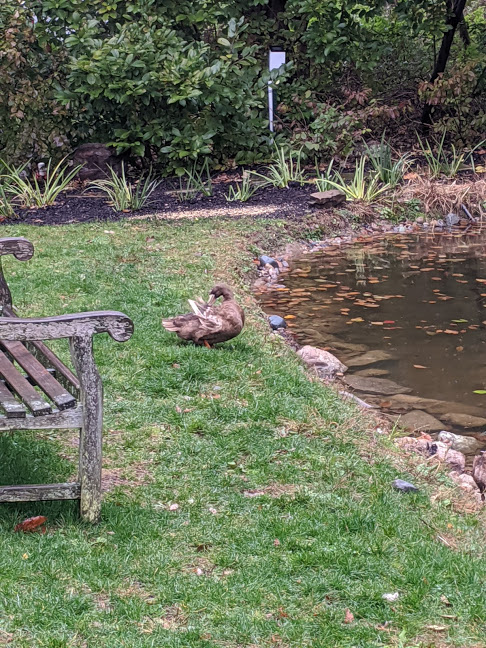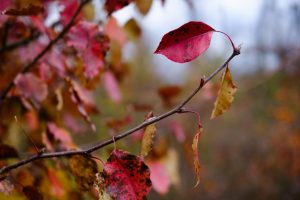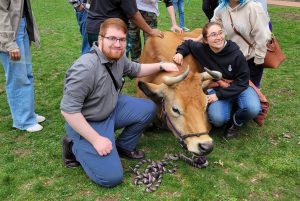An update on Chatham University’s resident duck: Howard
December 12, 2019
By Lucia Camacho
If you’ve spent time by the pond this semester, you might have noticed a few new additions to the pond’s population. Now, in addition to Howard, Chatham University’s resident duck- the pond is also home to Howard’s family.

Howard is now accompanied by his partner, Roberta, and his son Puddles. Roberta is a Chocolate Indian Runner and their son is identifiable as the larger of the two brown ducks, or the one without a white spot on his feathers. Puddles was born last spring and was sadly the only duckling of his brood to survive.
Now that their family has expanded, the Chatham carpenters are planning on removing the bachelor pad they built for Howard. As of late, this structure has mainly been used by Roberta to lay her eggs. They intend to create a new, larger house for the family that will have more buoys to sustain the house and a larger porch where the family can spend time.
Some people are concerned about how the new family will fare during the winter.
“They’ll make it through the winter. Howard was here last winter, and he made
it through,” said Kristen Spirl, Grounds Department manager at Chatham.
Ducks can survive in temperatures 20 degrees below Fahrenheit, and the grounds department keeps the pond circulated so it never fully freezes. This means that during the winter, the ducks will be able to stay in the pond as well as alternate between their floating house, the house in the woods and the patio outside of Mellon Board Room.
She speculated that Roberta, who Spirl affectionately calls Robbie, was dropped off at the pond in a similar manner as Howard. Last year, Howard was dropped off at the pond by a family who purchased him as a meal, but couldn’t bear to eat him. In Robbie’s case it’s possible that a family bought a duck, but had no idea how to take care of her. So they decided to place her in a pond, where they thought she would find company with Howard.
Though it ended happily, Spirl warns that purchasing domestic pets without the proper education is very dangerous.
“As an adult or somebody who cares about other things, you don’t incorporate something into your life if you don’t know how to care for it,” Spirl said.
Now that Chatham has a bigger family of ducks, Spirl asks that people respect them and treat them appropriately. The best way to inform yourselves about what ducks need and how to behave around them is to email Spirl and ask.
“Like most of us people [they] eat oatmeal, oats, unsalted nuts, little bits of lettuce,” Spirl said.
Feeding them the proper food is especially important now that winter is starting. The ducks will need extra food to keep them warm and healthy. She asks people to please refrain from pestering the ducks or letting dogs loose around them.
Spirl is the main person who takes care of the ducks. She feeds them, talks to them and makes sure they are okay. Spirl also has helpers who take care of the ducks when she is unable to; student gardeners sometimes feed and look after the ducks. Spirl would love to have more people to help feed the ducks.
Students should email her if they’re interested in taking care of some baby ducklings that may hatch in the spring. She can be contacted at kspirl@chatham.edu or through Instagram @chathamarboretum.






